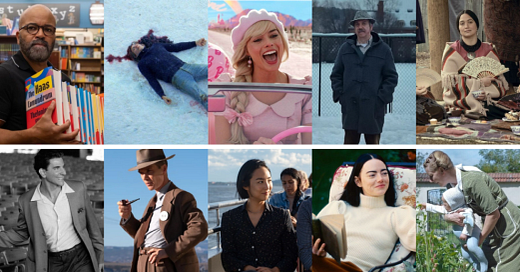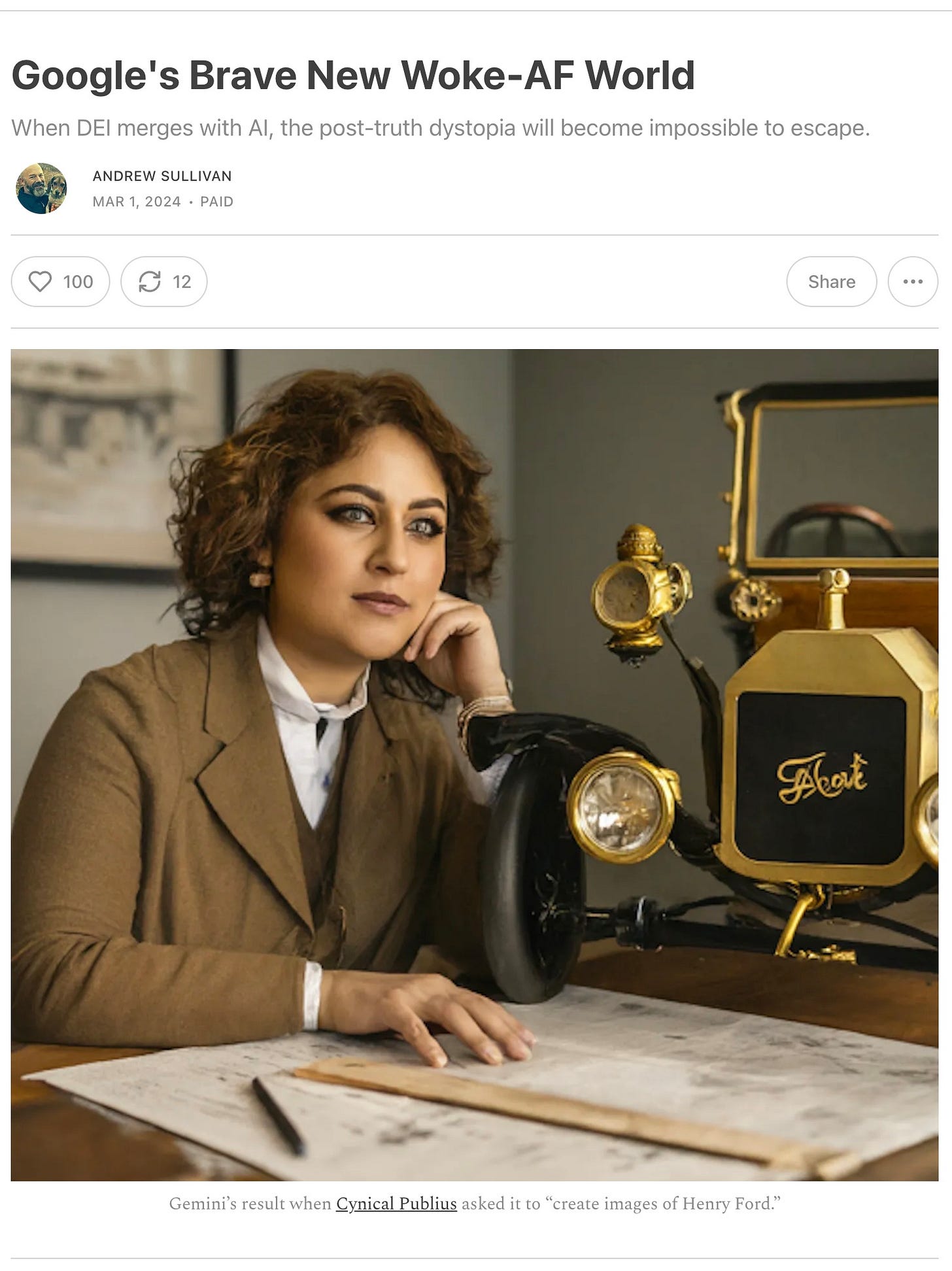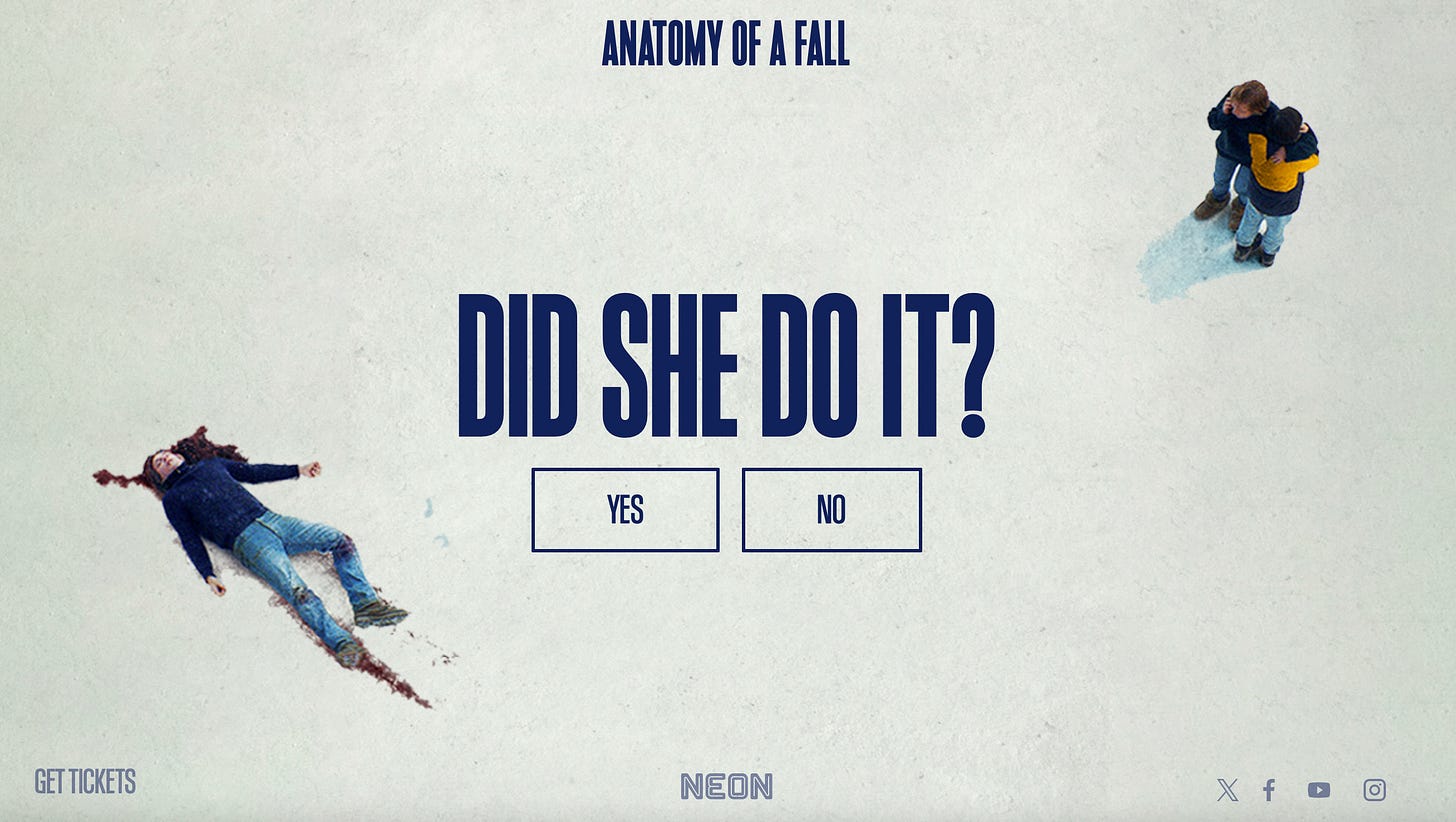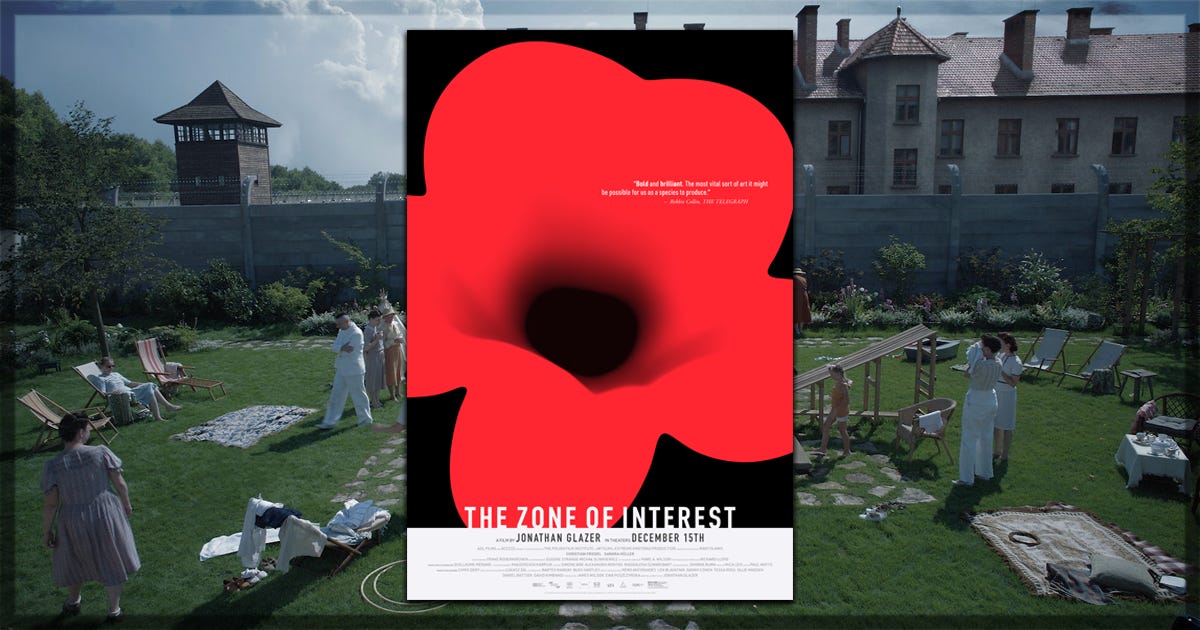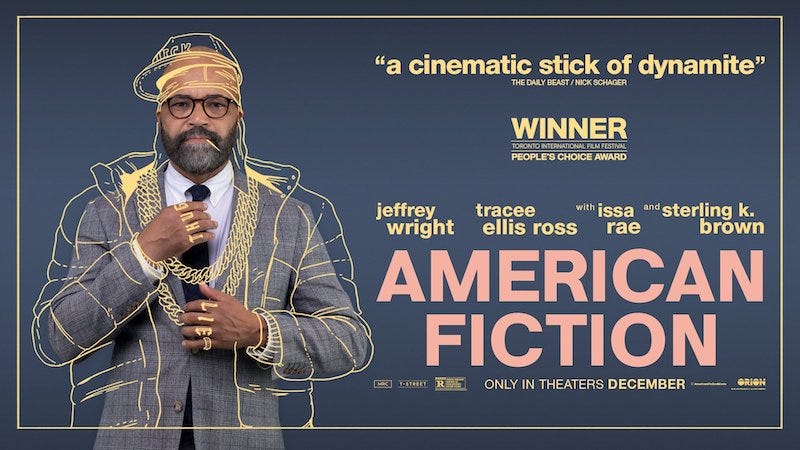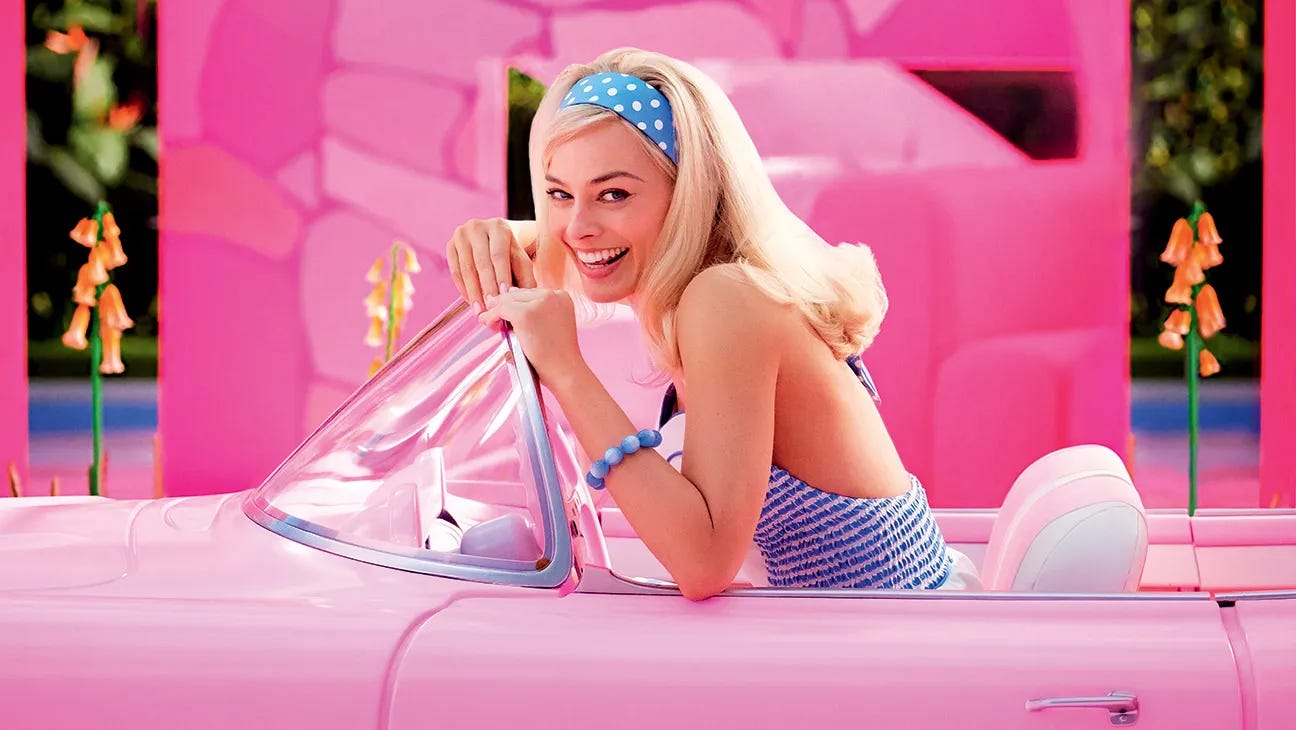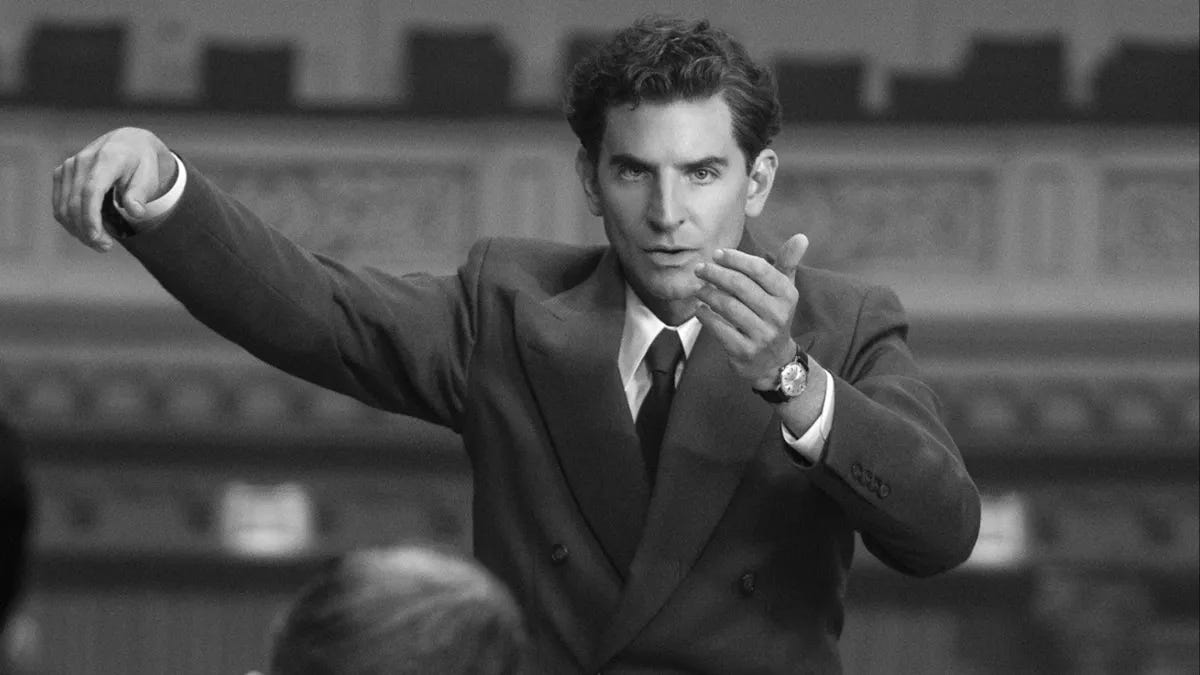Whew. I finished watching all 10 films nominated for Best Picture from 2023. The Oscars take place Sunday, March 10, 2024. My rankings:
Oppenheimer. 98%.
Anatomy of a Fall. 91%.
The Zone of Interest. 90%.
Poor Things. 89%.
The Holdovers. 88%.
Past Lives. 87%.
American Fiction. 80%.
Killers of the Flower Moon. 75%.
Barbie. 67%.
Maestro. 65%.
I wouldn’t recommend doing what I did, watching all but one of the Best Picture nominees in the span of three weeks. It’s like eating nine rich desserts in a row, instead of spacing out that hazelnut ice cream sandwich, molten lava cake, salted caramel pie, classic tiramisu, peanut butter crunch, croissant pudding, jumbo brownie, sacher torte, and gulab jamun.
And these flicks are pretty rich. What they can do with movies today is astounding. This is the year they restored my faith in the medium. For some time now, I’ve been upset that cinema was dead. But they’re back. And as my brother, Vikas, told me, it’s no coincidence that it’s inversely proportional to the comic book bombs. (It’s about time.) These feature films are a reminder of how much better movies are than television. There’s a reason there’s a big screen for them.
I’m gonna roll through only the Best Picture noms. I love a good acting performance but I care mostly about the top dog. I don’t fill out an Oscar Ballot. I’ve watched the Academy Awards every year since the 1980s, but there are many more writers out there who’ve studied which precursor awards (Golden Globes, SAG, Critics’ Choice) are the best prognosticators that I don’t stand a chance.
Bias certainly plays a role. How else would I rank five of the nominees within five points of each other? Then again, it’s also odd that nearly half the BP category is set in New England, New Mexico, and New York… in the Best Actress category, it’s a Stone vs. a Gladstone… the bunch contains a Snoop and a Snoopy… and they use the phrase “taken a lover” in both Poor Things and American Fiction, the latter in which the main character’s brother is drinking so much he’s also taking a liver.
Oppenheimer — 98%
The only one to blow me away. Though as the Joker said in an earlier Christopher Nolan film, “very poor choice of words.”
Welcome to a new age of filmmaking. Nolan takes a novel approach to such a technical topic. Every other movie I can think of includes a scene where they explain the equivalent of how an atomic bomb works. The closest they get is when Cillian Murphy’s character (um, Robert Oppenheimer) says that atoms contain mostly space. They know that people who are super interested can always go look it up on the interwebs later.
I had a hard time finding a single flaw. I hear the criticisms about how the direction didn’t work for some who claimed it was far too jump-cut. To me, the pacing was exactly what held my attention for all three hours.
I know I’m in the minority, but it’s the first time I’ve enjoyed Robert Downey, Jr. For most of his career (and most of my life), he falls into the Johnny Deep category: I really don’t understand why he’s THAT famous.
The only reason I’m even knocking off two percentage points is there’s something to the argument that Emily Blunt’s character wasn’t given enough to do. But not much of an argument. Not EVERY story has to pass a DEI test — especially ones set in TECH in the 1940s. The movie should accurately track history and this isn’t Google’s Woke AF World.
Ironically, I’d say that Blunt’s character’s blunt testimony rode hard for feminism even more than Barbie did. (Read on for that review.)
Sure, Blunt’s role was minor, but Rami Malek’s role was even smaller and he won BEST ACTOR only five years ago.
I had no idea Oppenheimer was such a womanizer and such a snob. There’s something more palatable about a science snob than an art snob. (But not more palatable about a womanizer regardless of profession.)
Anyone who didn’t appreciate this film for what it was should get a life. Well, since we’re dealing with radioactivity, they should get a half-life.
Anatomy of a Fall — 91%
I’ve spent the most time thinking about this one. The genius of True Detective’s first season is it gave us three focal points: the murder mystery itself, the relationship between the two cops, and Matthew McConaughey’s rantings. Similarly, AOAF was about how the husband fell. But it was even more about the relationships between him and his wife, the mother and son, and maybe even the boy and his dog.
The story is such a generator of conversation that my two-year-old son’s German swimming instructor and I did a deep-dive (pun intended) into the plot while Naveen was splashing around in the pool. She thinks the wife did it. I’m not so sure.
And I hate to admit it, but the prosecutor seemed like the villian because he’s bald.
The Zone of Interest — 90%
Currently being screened as a comedy in Gaza, The Zone of Interest is about the commandant of Auschwitz, Rudolf Höss, who lived literally right next door to the death camp, portraying how his family strives to build a dream life despite (because of?) the atrocities right over the wall.
This is the only one my wife refused to watch. Slavery movies are tough, but Holocaust movies are about as haunting as it gets. Whenever I see one, it sends me right down the rabbit hole, spending hours reading about what must still rank as the worst thing humanity has ever done.
It’s the slowest film I’ve seen since Joe Versus the Volcano in 1990. (And so similar.) But that’s the point: it’s the mundane life of a mass murderer, that whole “banality of evil” thing. It’s an even darker version of the day-to-day of mob boss Tony Soprano in The Sopranos.
The only funny part I could find was the scene when Höss tells his domineering wife, Hedwig, that he’s being promoted and transferred: she proceeds to yell at him to convey, in no uncertain terms, that she and the kids are NOT moving. They’ve built an idyllic life, like a deranged Trapp family. Based on the camera angle and, well, most of history, I thought he was gonna backhand her. But no, he slinks away, agreeing to go ask his boss if they can stay while he leaves. If a dude liked THAT can be henpecked, what chance do the rest of us have in a marriage? He must’ve been thinking, “Jesus, lady. How many Jews does a man have to kill to earn some respect around here?”
That’s terrible. However, it leads me to a realization: it brilliantly does not show any killings; you only hear them, which is the equivalent of Se7en and all its post-mortem gore. But beyond all the gunshots, barking dogs, trains, screams, and dull roar of the crematoria, perhaps the worst thing you hear is when Hedwig laughs and tells her mother she’s known as “the Queen of Auschwitz.” That joke somehow sounded worse than anything else.
Poor Things — 89%
What a beautifully weird film! Much like Shane Gillis’ standup (and this has to be the only instance where his style is compared to a twisted fairytale set in Victorian England), it took me about 15 minutes to get the rhythm of the feature. Director Yorgos Lanthimos seemed to blend the styles of Baz Luhrmann, Guillermo del Toro, and (Paul Thomas + Wes) Anderson.
Speaking of standup, I enjoyed watching two comics with whom I’ve shared a stage. The only meaningful interaction I’ve had with Rami Youssef was at the Laugh Factory when he told me he didn’t like one of my jokes (a joke that crushed, FWIW). Jerrod Carmichael and I have crossed paths multiple times and the dude couldn’t be nicer. That said, I felt Rami killed it and… let’s just say I’m scratching my head, wondering what exactly Jerrod is good at. He underperformed in his standup specials… he laid an egg when he hosted the Golden Globes… and here, he looked like Jerrod Carmichael reading his lines. But I still like him. And maybe that’s his genius.
The Holdovers — 88%
This was by far the most rewatchable of the ten. It’s an instant Christmas classic.
People kept saying, “It’s not Alexander Payne’s best; it’s decent.” Let’s unpack that. First off, it’s way better than decent. Secondly, it’s the first time Payne has featured people of color.
And Da’Vine Joy Randolph bodied her role. Absolutely amazing.
Past Lives — 87%
I loved the realism. There wasn’t a false note throughout. Each of the three main characters’ reactions was grounded in such reality. It’s not like he becomes an insane incel or she goes through a crazy “let’s tint my hair red and get-tied-up-in-an-hourly-hotel” phase. She becomes a bit more Americanized and makes the subtle changes we, as immigrants or children of immigrants, expect.
American Fiction — 80%
Very well-acted. Jeffrey Wright brought it as always. I’ve been a fan of Sterling K. Brown’s since he stood in for the late John Spencer in the live performance of The West Wing from 2020. They wrecked it.
It made me laugh and made some good points. But I couldn’t escape the idea that it felt like this could’ve been made five years ago. Could Oppenheimer or Poor Things? Sure, but those are period pieces. A modern-day film making social commentary loses some of its impact when it doesn’t feel quite as fresh.
Killers of the Flower Moon — 75%
Tough to justify the Old Bollywood-length of this epic.
I read that originally it was to be told from Jessie Plemons’ POV, from the perspective of the F.B.I., which would’ve been more compelling. Leonardo DiCaprio wanted to portray the man who marries into the tribe, Ernest Burkhart, so they had to flip the whole thing. I always find it interesting to think of movies as “about this person instead.” Like, if you think of No Country for Old Men as a tale about Tommy Lee Jones’ character, it’s very different from viewing it as simply following Javier Bardem “murdering half of Texas,” as it’s described on Reddit.
The coolest part of KFM (not to be confused with KMFDM) is to see the earliest version of an F.B.I. raid, which is a recurring theme throughout Martin Scorsese’s filmography. In fact, the Osage murders are the first F.B.I. case, period.
The biggest flaw is that the Native Americans are simply too passive. Perhaps this was true in this incident, but it doesn’t make for good storytelling.
There’s some bad acting in this, namely Tatanka Means as John Wren. You can always tell bad acting because they somehow seem superimposed on the screen, like Brett Favre in There’s Something About Mary, probably the worst performance ever. And Brendan Fraser, whom I adored in The Whale, overacted to an 11. His outbursts were hysterical and not in a good way.
I’m actually stunned that Lily Gladstone might beat Emma Stone for Best Actress. They didn’t give her enough to do! She was lying in bed for half the picture. It’s not like she harbored a brooding intensity; she was kinda flat. That said, as I today told one of my Jewish friends as we were discussing this stuff, most people who know me know that the one group for whom I feel the most sorry is the Native Americans. He agreed: They. Have. No Home. And still undergo extreme discrimination. So, though I’m fairly strongly anti-woke, I’m glad if Gladstone rocks Stone for the win.
Still, if Emma wins, I'm calling my tweet now:
Glad Stone Beat Gladstone.
Barbie — 67%
An entertaining movie, one that cannot be ignored with its billion-and-a-half box office gross, it doesn’t belong in this category. Greta Gerwig did not get snubbed: this is not a well-directed film.
It wasn’t fair to libel Mattel by portraying its board as all male. That hasn’t been true in years and does a massive disservice to, you know, real life.
I realize this will be a bit controversial, but as historically disenfranchised groups rightfully gain more power by gathering more seats at the table — and building our own tables — we need to decide what we want to do. Take True Detective: Night Country. I was ecstatic to watch since Jodie Foster is my all-time favorite actress. But the reality is that the ending, without giving too much away, was more of a celebration of a me-too comeuppance than it was good storytelling. Hey, look. That’s fine. The underserved have been waiting far too long to unspool our stories. But if the claim is that men have written one-dimensional female characters for too long — which we have — then turning around and portraying men as hapless or stupid isn’t any better. Here’s a chance to outdo what White men have done — a low bar when it comes to representation. And TD4 blew it. Will some women celebrate? Sure. But if you want to one-up men on this score, then it’s important to write three-dimension characters across the gender spectrum. And in that way, Barbie succeeded.
The sendup of men was one for the ages. Lampooning males for our obsession with The Godfather was priceless. So on the mark. And for men who didn’t find it funny, well, you’re wrong. It was hilarious. And for all the years of “women should learn to take a joke,” now it’s our turn not to dish it out but to take it.
As far as Ryan Gosling’s being nominated while Margot Robbie wasn’t, I think feminists missed the point: what it could mean is that the Best Supporting Actor category is that weak and the Best Supporting Actress category is that strong.
At the end, what women were fighting for was an equal world. And we should all be down with that.
Maestro — 65%
When R.E.M.’s “It’s the End of the World as We Know It” is blaring and actually hits the Leonard Bernstein lyric, I thought, “This is what I’d expect from this movie. It’s so on the nose.” And not just that fake nose Bradley Cooper was wearing.
This one was a slog. My wife asked aloud why Cooper is obsessed with making mediocre movies about music, referring to A Star Is Born. Sadly, Cooper’s career is starting to remind me of George Clooney’s: an actor who’s better than his flicks.
As stated, I don’t get into the prediction game and while I wouldn’t be stunned if Poor or Zone wins, I do think that Oppenheimer will have a huge night. And it should.

